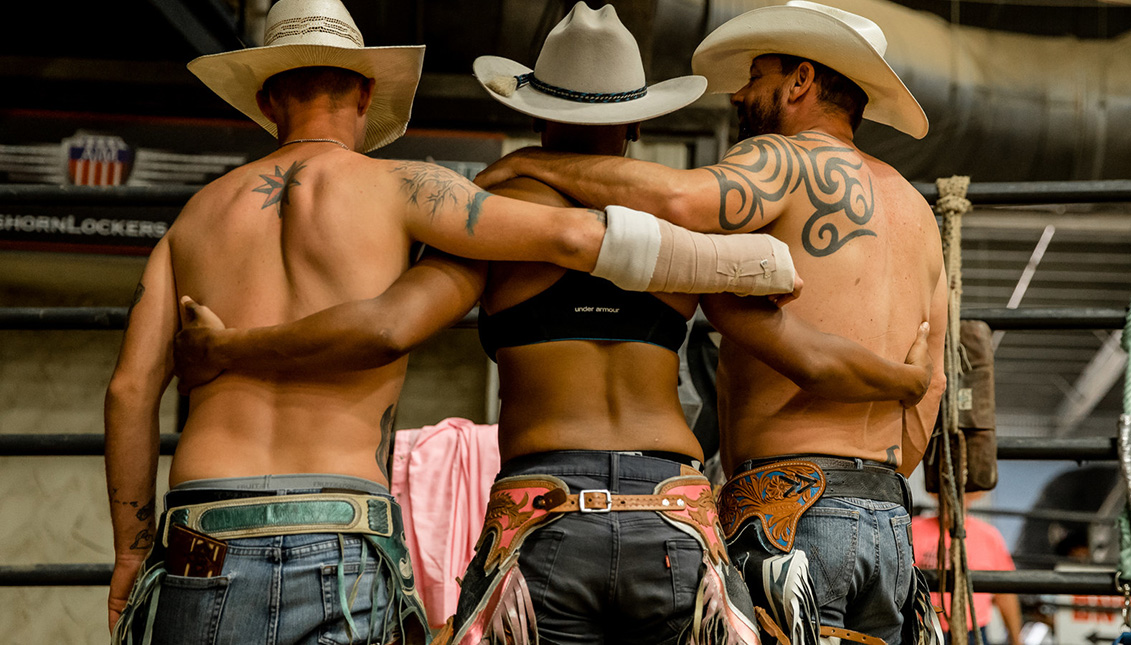
Queer Rodeo: Cowboys riding towards diversity
A heifer doesn't care who catches it. Why should we care?
Fifteen years ago, when director Ang Lee released Brokeback Mountain, the tragic love story between two gay cowboys caused a revolution in storytelling associated with queer and deep America, which has been so far seen as antagonistic.
However, a few decades before the debut of the colossal film, LGBTQ people were already riding bulls, roping heifers and organizing queer rodeos.
Today, through organizations like the International Gay Rodeo Association — with 15 chapters across the country — these queer cowboys are the most disruptive and iconic image of an America trying to shed the racial and gender stereotypes historically associated with what it means to be and feel American.
They're a big family, yes, with their spurs and boots, riding beyond prejudice.
When Jorge Sanchez (43) was a boy from Minnesota, he played in the marching band. But as he grew up, his love for show business led him to another kind of entertainment: the art of drag, and finally the rodeo.
Last year he became the new star of the queer rodeo by being crowned MsTer IGRA by the International Gay Rodeo Association.
"I try to drag with compassion. I want people to feel what I feel, if I can do that, then I'm doing my job," Sanchez told BuzzFeed. "The most important thing about this rodeo family is to be family. If someone has a hard day, we're all here to get up. There is no trial. Everyone gives love, support. It's an incredible organization."
There are ways and means of "Making America Great," but dividing it up is not the best. In the rodeos, a mixture of drag fantasy - like putting ruffled underpants on a goat — agricultural practices, and traditional bull riding, the premise is one and for everyone: What really matters is what happens in the arena, not who you vote for or where you come from.
"The rodeo connects homosexuals who have grown up in that culture with outsiders who are attracted to men and women in cowboy boots," Nadine Hubbs, author of the book Rednecks, Queers, and Country Music, and professor of Women's Studies and Music at the University of Michigan, told Document Journal's Mark Smith.
She added that these detours do what seemed impossible in an America with deeply divided social spaces, especially when cowboy culture has been heavily politicized by Republicans.
"Some of these people probably voted for Trump and may like what he has done as president even if they are queers. But people in the gay rodeo don't flaunt their political tendencies," Hubbs said.
But also, where others put up walls, the gay rodeo has shown itself to be a place of true ethnic diversity:
"In rodeos there are many rural white people, but also African Americans wearing hats and boots, and also many Latinos, including Mexican-Americans from whom, let's not forget, we get words like 'rancho', 'buckaroo' and even 'rodeo,'" she concluded.
The same is true for the bull-rider Lee, formerly known as Breana Knight, who challenges the idea that the rodeo and all of rural America is the territory of only white "machos."
RELATED CONTENT
"The animal doesn't care if I'm male or female, gay or straight. When I'm riding, it's the only time I can legitimately say that I'm not going to be judged," said the African-American and lesbian singer, who has never identified with urban queer culture and links it to partying and consumerism.
"The queer rodeo world played a different chord. "It's much more about a connection to the land, to the animals, to the community," she said in another interview with The Guardian.

About four years ago, iconic photographer Luke Gilford was at a Pride event in Northern California when he heard Dolly Parton's music and what he discovered changed his image of rodeo forever.
"We all know what a gay is and we all know what a rodeo is. We don't think they go together," he told The Guardian this September, when his photography monograph, National Anthem, was released, reflecting on America's cultural symbols through images that break the stereotypes that shackle us. Stereotypes like the machismo, racism and homophobia apparently inherent in the world of the rodeo.
"In school we are taught to recite the national anthem every morning. It has an aura of promise. But as we grow older, we realize that this promise is a kind of myth. What I think is really beautiful, and so inspiring, about the gay rodeo community is that it brings back that aura of promise. It spans both ends of the American cultural spectrum: people who live on the land, but who are also queer," said Gilford, who was born in Colorado and father was a champion of the sport.
"This is the America we all dream of, being able to be what we want to be."
The history of the gay rodeo is inseparable from the struggle for civil rights. The first of its kind took place in Nevada in 1975, when Phil Ragsdale, then Emperor I of Reno, was looking for a creative way to raise money for a Thanksgiving dinner benefit for the elderly. Then the idea emerged to stage an amateur gay rodeo at the Washoe County Fair, which was attended by about 100 people and set a precedent for the future not only for its community aspect, but also its transgressive way of "hacking" at prejudices related to gays and conservatism.
While at first the meetings of these cowboys in the 70s and 80s were secret and often organized by right-wing Christians who avoided giving their names — they were known as "silent members" — with the emergence of the Internet, cyber-ranches proliferated, before giving way to a real, diverse and unhindered arena.
As Gilford wrote in National Anthem: "This is the America we all dream of, being able to be what we want to be."











LEAVE A COMMENT: